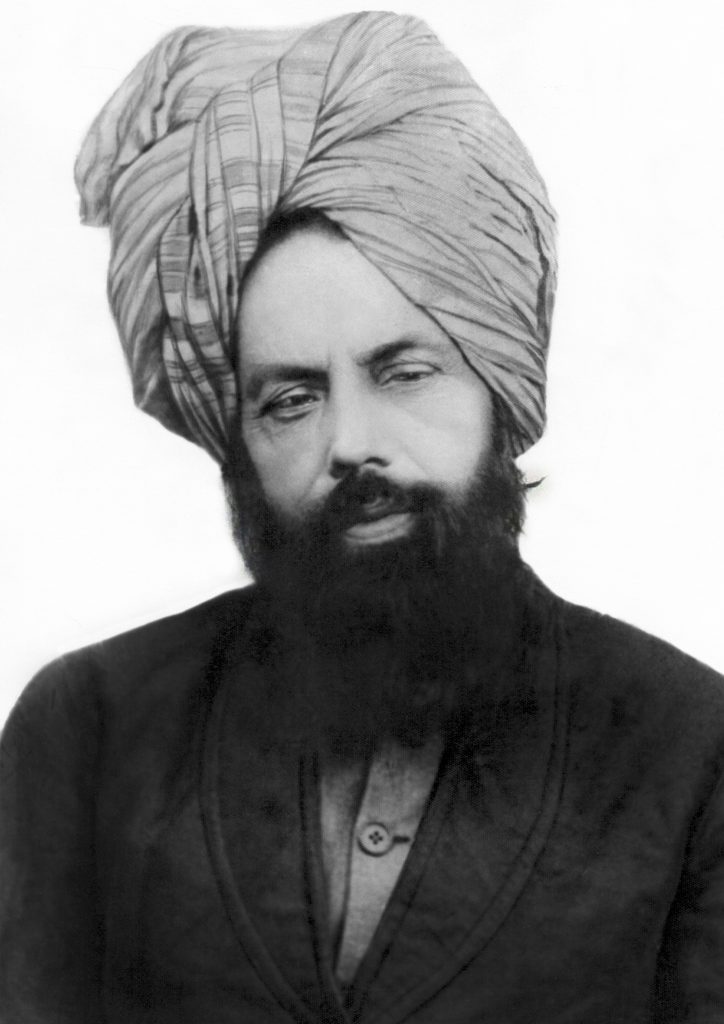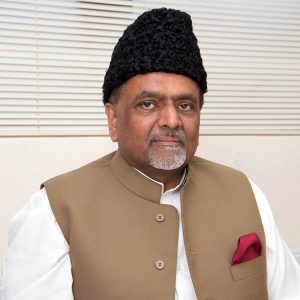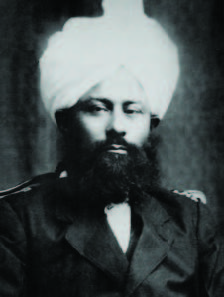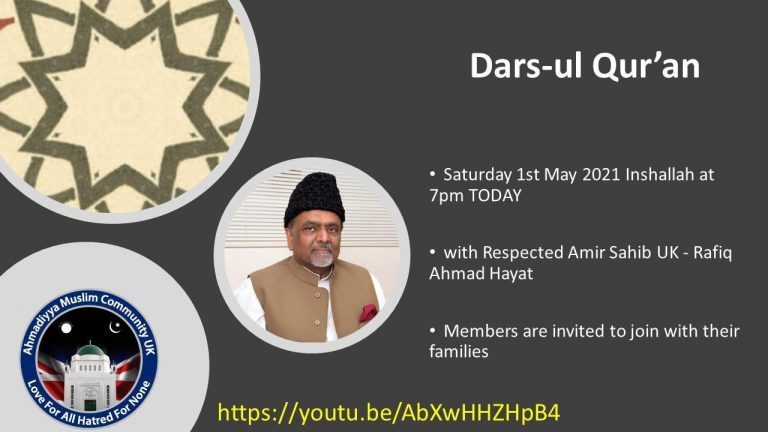After Tilawat-e-Qur’an and Nazm, Amir Sahib introduced the first speaker of the day, Maulana Tahir Selby, Missionary Hartlepool. Speaking on the need of the Imam, Selby Sahib mentioned the Hadith of the Holy Prophet (peace and blessings of Allah be on him) in which he is reported to have said that while the children of Israel were divided into 72 sects, Islam would be divided into 73, and that all of them would be destined for the fire of Hell except for one. The Holy Prophet (peace and blessings of Allah be on him) clarified that the one sect which will be saved will be those who follow his Sunnah and that of his Companions. This is the time in which we see that Muslims are so disunited. No Sunni Muslim today would accept a Shia leader, nor would a Shia Muslim accept a Sunni Imam (as Khalifa). The only way out of this dilemma is for the Imam to be appointed by Allah Himself. In this case all Muslims would have to accept him. The argument some people give is that if we have the Holy Qur’an, Hadith and the Sunnah to guide us, we don’t need anyone else. But looking at the present state of the Muslims, it is clear that something is lacking by way of guidance. Muslims are killing one another and calling each other Kafirs. One example of their lack of understanding of the teachings of Islam is the belief that the punishment for apostasy is death, but this is not mentioned in the Holy Qur’an. On the contrary, Allah says clearly that if a person believes, then disbelieves, and thereafter believes and disbelieves for a second time, Allah will not forgive him. So, if the punishment for apostasy was death, then there would no question of that person believing and disbelieving for a second time. Selby Sahib gave further examples about the teachings of the Holy Qur’an have been misinterpreted, eg the punishment for adultery, blasphemy, hence the need for the need for a divinely appointed Imam.
A virtual online Promised Messiah Day was organised by the UK Jama’at on Saturday 20th March 2021. Proceedings were chaired by the Amir UK Mr Rafiq Ahmed Hayat and streamed live n YouTube.
Selby Sahib continued by saying that the Holy Prophet, peace and blessings of Allah be on him, has given many indications about the appearance of the Mahdi and the Promised Messiah, and has urged Muslims that when he arrives they should go to whatever lengths necessary to reach him in order to pledge allegiance to him. Allah has sent Hazrat Mirza Ghulam Ahmad as the Promised Messiah and the Mahdi so that Muslims should be rightly guided and to follow the teachings of Islam properly. His mission was also to unite mankind under the banner of Islam. It was Allah’s design that this should happen in the latter days in the time of the Promised Messiah. Every religion teaches the concept of a second coming, and it is not possible that there will be several of these religious teachers appearing at the same time with conflicting dogmas. Instead of creating unity, this situation will exacerbate the division among mankind and lead to further tensions. The only solution is for only one teacher to be sent, who will represent all the earlier prophets, and thus unite mankind. The person who fulfils this role is the Promised Messiah, Hazrat Mirza Ghulam Ahmad of Qadian, and only by accepting him will mankind be united. The Promised Messiah categorically makes this declaration in his book “The need for the Imam”.
The next speaker was a Waqfe Nau child, Khalid-ud-Din, who spoke on the early life of the Promised Messiah (peace be upon him). He drew attention to the fact that the early life of a prophet, before he makes his claim to prophethood, is very important, as is mentioned in the Holy Qur’an. This was true for the Holy Prophet (peace and blessings of Allah be on him) and was also true for the Promised Messiah (peace be upon him). He stated that this proof is provided by Allah to establish the truth of the Promised Messiah (peace be upon him). Mr Khalid also mentioned the fulfilment of the prophecy contained in the Holy Qur’an in Surah Jumu’ah, in which the Holy Prophet (peace and blessings of Allah be on him) describes the person who would revive the religion as being of Persian descent. This was true of the Promised Messiah (peace be upon him). His only teachers were private tutors and did not have any regular schooling. His contemporaries described him as being pious, not interested in worldly matters, or games and sports as other children. He was never mischievous or dishonest, nor used foul language. He would distribute his food to the poor, often without the knowledge of his family. Mr Khalid-ud-Din concluded by saying that the early life of the Promised Messiah (peace be upon him) is an example of a blessed youth, from his honesty and integrity to his compassion and selflessness, his relationship with Allah, and love of the Holy Qur’an, and the Holy Prophet (peace and blessings of Allah be on him).
Maulana Abdul Majid Tahir, Addl. Wakil-ut-Tabshir, then addressed the meeting on “The Promised Messiah’s Love for the Holy Prophet, peace and blessings of Allah be on him”. This was in Urdu. He said that the life of the Promised Messiah (peace be upon him) is filled with the love of the Holy Prophet (peace and blessings of Allah be on him) and, as such, is without comparison. His poems in Urdu, Persian, and Arabic demonstrate his love for the Holy Prophet (peace and blessings of Allah be on him). One cannot find such love and admiration for the Holy Prophet (peace and blessings of Allah be on him) anywhere else. For instance, the Promised Messiah writes,
“That leader who is ours, whose name is Muhammad, is my love; I am sacrificed upon that light. Who am I? He is everything. And this is the decree of God Almighty”.
He also says,
“After the love of God the Almighty, I am intoxicated with the love of the Holy Prophet, peace and blessings of Allah be on him. If, according to anyone, this is disbelief and heresy, then I call God to witness that I am the greatest heretic.”
Maulana Abdul Majid Tahir continued saying that this display of love for the Holy Prophet (peace and blessings of Allah be on him) is also evident in the Arabic poems of the Promised Messiah (peace be upon him). Hazrat Mirza Bashir Ahmad (Allah be pleased with him) declared on oath that God Almighty is his witness, that whenever the name of the Holy Prophet (peace and blessings of Allah be on him) was mentioned, his eyes would well up every time. In one incident, the Promised Messiah (peace be upon him) was invited to a meeting organised by the Arya Samaj, who promised that they would not abuse the Holy Prophet (peace and blessings of Allah be on him) in that gathering. Under that condition, the Promised Messiah (peace be upon him) agreed and wrote a speech for Hazrat Maulvi Nooruddin (Allah be pleased with him) and some others to address the gathering. However, despite their promise, the Arya Samaj poured abuse on the Holy Prophet (peace and blessings of Allah be on him). When the Promised Messiah (peace be upon him) heard about this later on, he became very annoyed with those companions and asked them,
“How was your dignity able to tolerate this? You tolerated the fact that your Master (i.e. the Holy Prophet, peace and blessings of Allah be on him) was being abused and yet you remained sitting silently there?”
Maulana Abdul Majid Tahir went on to state that the Promised Messiah (peace be upon him) had further declared that for the whole of mankind there was no other arbitrator except the Holy Prophet (peace and blessings of Allah be on him). Therefore it was imperative that we should truly and firmly follow this Prophet of Almighty God and do not give anyone else preference over him. May Allah enable us to do so.
A short video on Qadian was presented which narrated the incidents leading to the Promised Messiah (peace be upon him) making his announcement that he was appointed by God and inviting followers to take the pledge of allegiance at his hands. This began with his book Braheen-e-Ahmadiyya. Though there were many who were keen to do Bai’at at his hands at that time, he refused until commanded by Allah the Almighty. Following this, he published the Ten Conditions of Bai’at which he expected his followers to adhere wholeheartedly. Finally, on 23 March 1889, he travelled to Ludhiana, and in the house of Hazrat Sufi Ahmad Jan he invited his sincere followers to take the Bai’at and thus the foundation of the new Jama’at was laid.
This video was followed by an update on the Baitul Futuh Project from Secretary Jaidad UK Mr Irfan Qureshi. He announced that while the major construction works have been completed and the main contractor has left the site handing over the building to the Jama’at, the internal refurbishment and installation continues. He presented a series of photos showing aerial external views of the buildings, and others to show how the internal work is progressing.
This short interlude to the proceedings ended with an MTA news bulletin on the recent corona virus vaccination which took place in the Tahir Hall was shown, where over 1,000 people were vaccinated. (A full report of this has already been updated on the Ahmadiyya Bulletin website).
The concluding speech of the programme was delivered by Mr Rafiq Ahmed Hayat, Amir UK, who related the prophecies contained in the Holy Qur’an and Hadith which referred to the coming of the Promised Messiah (peace be upon him).
He explained that Hazrat Mirza Ghulam Ahmad, before his announcement that he was the Promised Messiah, was widely acclaimed by many Muslim scholars of the time that he was the Champion of Islam because of his writings. However some of these scholars turned against him when he made this announcement and started to persecute him. The Promised Messiah (peace be upon him) declared that God wants to bring all righteous souls towards the Tawheed, the Unity of God, and that he had been sent for this very reason. Further, he said that he had been granted this status because of his love for the Holy Prophet (peace and blessings of Allah be on him). He declared that there is no other prophet or intercessor for humanity except the Holy Prophet (peace and blessings of Allah be on him) and this is our belief.
Amir Sahib went on to say that our forefathers underwent many sacrifices when they accepted Ahmadiyyat, and often were boycotted by their own families. He recounted the experiences of his own grandfather when he accepted Ahmadiyyat, while his grandmother was staunchly against it. He wanted to attend one Jalsa Salana in Qadian but did not want to let her know where he was going as he knew she would try to stop him. So, he went without telling her, but she soon found out and followed him to Qadian with the intention of bringing him back home. After the Jalsa, he stayed on in Qadian for a few days and returned home expecting his wife to be very cross with him. Instead, he found her waiting for him smilingly. She then explained that she had followed him to Qadian, but on arrival there, because of the Purdah arrangements, she found herself on the ladies’ side of the Jalsa gah with no chance of meeting him, so she decided to stay on and listened to the speeches. She said that she then realised that what she was listening to was nothing more than the pure teachings of Islam and this affected her so much that she accepted Ahmadiyyat before leaving Qadian.
Amir Sahib said that even to this day, we can see that our families in Pakistan are making huge sacrifices because of their faith. We hear on a regular basis of Ahmadis being persecuted, subject to target killing, imprisoned just because of their faith, denied education or work due to their religion. Some other Muslim countries have also started this persecution. We must therefore ensure that these sacrifices do not go to waste. We must endeavour to attain the highest standard that is expected of us. Here in the West, we have the freedom to practice our faith freely, and must not therefore forget the purpose of our creation, which is to attain a relationship with our Creator.
Amir Sahib cautioned that although the majority of Ahmadis are aware of their obligations, there is a minority who seem to have been caught up in the bright lights of the materialistic world. This is not the way to attain the true inner peace we all crave for. No matter how much wealth you accumulate, you will not have peace of mind until you have communion with Allah the Almighty. Our focus should be on winning the pleasure of Allah.
Amir Sahib went on to describe the true character of an Ahmadi. He said as such we must first follow the Word of Allah, the words of the Holy Prophet (peace and blessings of Allah be on him) the words of the Promised Messiah (peace be upon him), abide by the conditions of Bai’at and the words of the Khulafa. It is important to have a close connection with Allah the Almighty through prayer. Successful indeed are the believers who are humble in their prayers and who keep aloof from what is vain. Every Ahmadi should do a self-analysis every day, every week, every month, and every year. Each day we should tread on the path of the Holy Prophet (peace and blessings of Allah be on him) and try to fulfil our pledge of Bai’at to the Promised Messiah (peace be upon him). And we should avoid all sins and vices. Continual self-assessment is needed to ensure we maintain the high standard that is required of us.
Amir Sahib stated that the month of fasting is fast approaching and will be upon us in a few weeks. This will give us further opportunity to supplicate to Allah the Almighty to improve our character and conduct and make sure our relationship with other people is up to the level that is expected of us. Allah has already blessed us with huge number of victories and Ahmadiyyat will continue to grow but it is up to us whether we will be part of that victory or will we be left behind. We have been blessed with the institution of Khilafat, which the rest of the Muslim Ummah have been deprived of. So, we must pray for Huzoor and his family so that we may continue to receive Allah’s blessings from this institution.
The meeting ended with a silent led by Amir Sahib.





